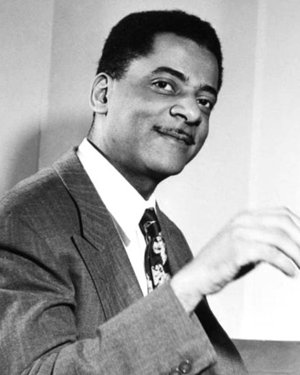Teddy Wilson

-
Birth Name
Theodore Shaw Wilson -
Born
November 2, 1912
Austin, Texas -
Died
July 31, 1986 (age 73)
New Britain, Connecticut -
Featured Vocalists
Thelma Carpenter
Many critics consider Teddy Wilson one of the greatest jazz pianists of all-time. Influenced by Earl Hines, he later developed a style all his own. His early recordings were percussive and forceful, but as he matured his technique became graceful, almost elegant. He was a gifted artist who used the full range of his instrument to his advantage. His recordings with Benny Goodman’s trio and quartet during the 1930s are considered classics.
Wilson studied music at both the Tuskegee Institute and Alabama’s Talladega College. He worked in Detroit and Toledo, Ohio, with Speed Webb and Milton Senior before moving to Chicago, where he played with the likes of Erskine Tate, Eddie Mallory, Clarence Moore, Jimmy Noone and Louis Armstrong. He traveled to New York in 1933 to join Benny Carter’s orchestra, the Chocolate Dandies.
After Carter disbanded the following year to take a position as arranger with Goodman’s band, Wilson worked with an all-star group led by Red Norvo and with Willie Bryant’s band, where he stayed into 1935. He met Goodman that year and in 1936 was asked to join the bandleader’s trio, which also included drummer Gene Krupa. Lionel Hampton joined soon after, making it a quartet. Wilson became the first African-American featured in Goodman’s line-up, though neither he nor Hampton played onstage with the band. During Goodman concerts, the orchestra would take a break, and Goodman’s small combo would come out and play.
During his time with Goodman, Wilson put together several groups for recording sessions. Billed by the Brunswick label as Teddy Wilson and His Orchestra, though they were actually just studio bands, these sessions featured such artists as Lester Young, Roy Eldridge, and Harry James and singers Billie Holiday, Lena Horne, Ella Fitzgerald, Nan Wynn, and Helen Ward.
As Bandleader
In early 1939, Wilson left Goodman to form his own band. His booking agency, MCA, first tried to organize a small swing group that complimented his piano style, but Wilson ended up forming a standard big band instead. It included such top musicians as Doc Cheatham, Ben Webster, Rudy Powell, and Hal Baker. Thelma Carpenter provided vocals. The orchestra opened at New York’s famous door on April 15 and, as Down Beat magazine put it, “laid a huge egg.” The club gave Wilson’s band two-weeks notice.
Wilson’s subtle style ultimately failed to win over audiences, who often complained that his orchestra sounded “too white.” Carpenter left in October under what she called “very unpleasant circumstances.” The band spent the winter at the Golden Gate in Harlem, soon after which it disbanded. Wilson then formed a sextet that played regularly at the Cafe Society in New York from 1940 to 1946. Goodman tried to persuade Wilson to return to his orchestra in September 1940, but Wilson decided against it.
After 1946, Wilson worked mostly as a soloist or in a trio. In 1946, he became a staff musician for CBS radio. He taught at Juilliard in the early 1950s, becoming one of the first jazz musicians to do so. Reuniting with Goodman occasionally, he traveled with the King of Swing on his 1962 tour of the Soviet Union. He also toured with his own orchestra in 1957.
Teddy Wilson passed away in 1986 at age 73.
Sources
- Simon, George T. The Big Bands. 4th ed. New York: Schirmer, 1981.
- “Teddy Wilson's Opener Set For The Door Soon.” Down Beat Apr. 1939: 1.
- “Orchestra Notes.” Billboard 29 Apr. 1939: 12.
- “Hawkins Gets 9-Piece Jam Outfit Going.” Down Beat 15 Oct. 1939: 5.
- “Shaw Walkout Named Top Story of the Year.” Down Beat 1 Jan. 1940: 4.
- “Wilson Back With Benny.” Down Beat 1 Oct. 1940: 1.
- “BG Begins Rehearsals.” Down Beat 15 Oct. 1940: 1.
- “Are Negro Bands Doomed As Box-Office Attractions.” Down Beat 1 Dec. 1940: 23.
- “Who's Who in the Bands: Teddy Wilson.” Down Beat 15 Jul. 1940: 22.
- “Barney Finds Self Between Two Bands.” Down Beat 1 Jan. 1943: 9.